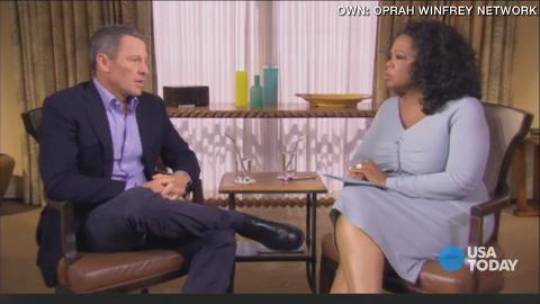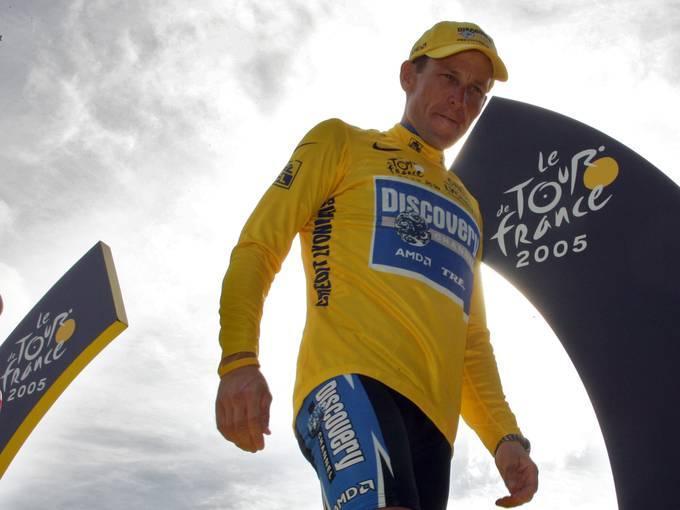The federal government said Friday that Lance Armstrong committed fraud through several years of cheating, lies and broken promises.
And now it wants its money back times three – possibly more than $90 million.
The U.S. Justice Department made it official Friday when it announced that it has joined a civil fraud lawsuit against Armstrong under the False Claims Act. By joining the suit, the government is teaming up with another confessed cycling cheat, Floyd Landis, who filed the case under seal in June 2010.
MORE: Feds may decide on Armstrong case this week[1]
ARMSTRONG: Says no again to USADA[2]
Landis’ suit accuses Armstrong and his associates of defrauding the U.S. Postal Service during their tenure with the USPS cycling team. Because Armstrong and other USPS cyclists used banned drugs and blood transfusions to gain an advantage, the suit argues they violated their sponsorship contracts with the USPS and that the government should get its money back.
Between 2001 and 2004 alone, the USPS paid $31 million to sponsor Armstrong’s cycling team, which included Landis as a teammate.
“Lance Armstrong and his cycling team took more than $30 million from the U.S. Postal Service based on their contractual promise to play fair and abide by the rules – including the rules against doping,” said a statement from Ronald C. Machen Jr., U.S. Attorney for Washington, D.C. “The Postal Service has now seen its sponsorship unfairly associated with what has been described as ‘the most sophisticated, professionalized and successful doping program that sport has ever seen.’ This lawsuit is designed to help the Postal Service recoup the tens of millions of dollars it paid out to the (Armstrong’s) cycling team based on years of broken promises. In today’s economic climate, the U.S. Postal Service is simply not in a position to allow Lance Armstrong or any of the other defendants to walk away with the tens of millions of dollars they illegitimately procured.”
Under the False Claims Act, the government can recover treble damages – possibly more than $90 million, with Landis in line to get up to 25% as the whistleblower who brought the case to the government’s attention. The government said it will file its formal complaint within 60 days.
In a statement, Armstrong attorney Robert Luskin disputed the allegation that the government suffered damages.
“Lance and his representatives worked constructively over these last weeks with federal lawyers to resolve this case fairly, but those talks failed because we disagree about whether the Postal Service was damaged,” Luskin said. “The Postal’s Services own studies show that the service benefited tremendously from its sponsorship – benefits totaling more than $100 million.”
It’s another huge legal headache for Armstrong, who was under criminal fraud investigation by the federal government until it dropped that case without explanation in February 2012. After considering it for nearly three years, the government now picks up Landis’ civil fraud case right when Armstrong might be most vulnerable to it.
A few weeks ago, the former cyclist confessed on national television that he engaged in doping during all seven of his victories in the Tour de France from 1999 to 2005. The admission provided ammunition to those who believed they were defrauded by such cheating, including the government, which cited Armstrong’s televised confession in its announcement Friday.
If the government had decided not to join the case, Landis could have proceeded on his own without the resources of the federal government to back him. But now that the government has joined his cause, the suit adds to Armstrong’s legal woes as the biggest of the bunch.
The suit names co-defendants Tailwind Sports, the cycling team’s management company, and the team’s manager, Johan Bruyneel.
If the government can prove damages, any of the defendants could be held liable for the entire amount.
The biggest problem for the government just might be proving those damages. Armstrong’s attorneys are likely to argue that the USPS was not defrauded at all, but instead benefited from the sponsorship. According to economic benefit studies conducted for the USPS, the USPS received around $100 million in value from the cycling team sponsorship thanks to media coverage and related benefits from 2001 to 2004.
BRENNAN: Armstrong sends smokescreen instead of truth[5]
“The government will say they would not have paid out the money if they knew he was violating the contract, and presumably Armstrong’s attorneys will argue that even if that’s the case, the government got value otherwise,” said Jason Workmaster, a Washington, D.C., attorney who specializes in cases under the False Claims Act. “They could argue that value is worth a certain amount of money, and that it offsets what the government paid out.”
Additionally, Armstrong’s attorneys might argue that parts of the case are too old to be subject to the False Claims Act, with some of the evidence dating to more than 10 years ago.
Such an issue would be argued in front of a judge before trial. And it might not even get that far. Most of these cases are settled before trial, and the two sides have been trying to reach a settlement for weeks.
But by joining the case, the government appears to have gained leverage in such talks. Landis also has gained an upper hand against his old enemy Armstrong, who once portrayed him as a fraud and a liar.
After years of denials in 2010, Landis confessed that he cheated to win the 2006 Tour de France. He was one of the first to accuse Armstrong of cheating, too – an allegation that drew a fierce response from Armstrong, who denied it and attacked Landis’ character.
Now they square off in federal court, confessed cheater vs. confessed cheater, with the government joining forces with one against the other.
“The Postal Service contract with Tailwind required the team to enter cycling races, wear the Postal Service logo, and follow the rules banning performance-enhancing substances – rules that Lance Armstrong has now admitted he violated,” said a statement from Stuart F. Delery, principal deputy assistant attorney general for the Civil Division of the Justice Department. “Today’s action demonstrates the Department of Justice’s steadfast commitment to safeguarding federal funds and making sure that contractors live up to their promises.”

References
- ^ http://www.usatoday.com/story/sports/cycling/2013/02/20/lance-armstrong-floyd-landis-tour-de-france-lawsuit/1934281/ (www.usatoday.com)
- ^ http://www.usatoday.com/story/sports/cycling/2013/02/20/lance-armstrong-usada-deadline-again/1931793/ (www.usatoday.com)
- ^ Last Slide (rssfeeds.usatoday.com)
- ^ Next Slide (rssfeeds.usatoday.com)
- ^ http://www.usatoday.com/story/sports/columnist/brennan/2013/02/20/lance-armstrong-doping-in-cycling-no-cooperation-past-deadline/1933601/ (www.usatoday.com)
